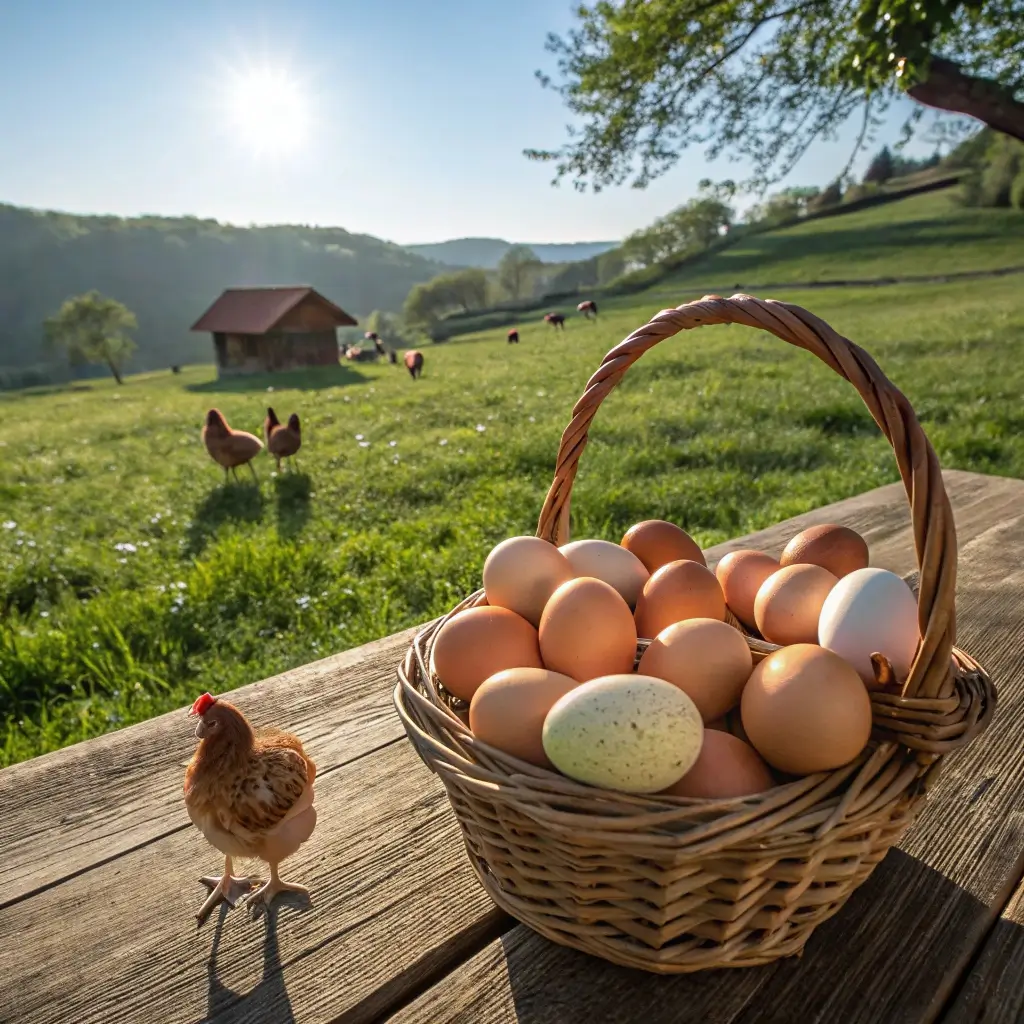Introduction: What Are Pasture-Raised Eggs?
If you’re a breakfast lover or an egg enthusiast, you’ve probably seen pasture-raised eggs in the grocery store. But what exactly makes these eggs special? Are they really worth the hype—or the higher price tag? Let’s crack this topic wide open (pun intended) and explore why pasture-raised eggs are not just a trend but a healthier and more sustainable choice for your plate and the planet. 🥚🌎
Defining Pasture-Raised Eggs
Pasture-raised eggs come from hens that roam freely outdoors on pasture, with ample space to forage for bugs, seeds, and grasses. According to the Certified Humane Program, these hens must have at least 108 square feet of outdoor space per bird—a far cry from the cramped conditions of factory farms.
This freedom allows the hens to live more naturally, engaging in behaviors like scratching the ground and dust bathing. Not only does this improve the hens’ quality of life, but it also impacts the quality of the eggs they produce.
“Pasture-raised eggs are the gold standard for humane and sustainable farming, prioritizing animal welfare and environmental health.”
How Pasture-Raised Eggs Differ from Other Types of Eggs
When you walk through the egg aisle, you’re bombarded with terms like “cage-free,” “free-range,” and “pasture-raised.” So, what’s the difference? Here’s a quick breakdown:
| Egg Type | Living Conditions | Outdoor Access |
|---|---|---|
| Cage-Free | Hens live indoors in large barns but have no access to the outdoors. | None |
| Free-Range | Hens have some outdoor access, typically limited to small fenced areas. | Minimal |
| Pasture-Raised | Hens roam freely outdoors on pasture, with ample space to forage naturally. | Extensive (108+ sq ft/hen) |
Pasture-raised eggs stand out for their superior living conditions, resulting in healthier, happier hens and higher-quality eggs.
Why Pasture-Raised Eggs Are Gaining Popularity
So why are more people choosing pasture-raised eggs? It boils down to three main reasons:
- Health Benefits: These eggs are richer in nutrients like Omega-3 fatty acids and Vitamin D, making them a healthier choice.
- Animal Welfare: Consumers are increasingly aware of the inhumane conditions in factory farming and want to support ethical practices.
- Sustainability: Pasture-raised farming methods are better for the environment, reducing the carbon footprint and promoting biodiversity.
“Choosing pasture-raised eggs isn’t just about what’s on your plate—it’s about supporting a healthier food system.”
H2: The Nutritional Benefits of Pasture-Raised Eggs
When it comes to nutrition, not all eggs are created equal. Pasture-raised eggs pack a nutritional punch that sets them apart from their conventional and even cage-free counterparts. Let’s dig into the science and see why these eggs are worth the extra cost.
Higher Levels of Omega-3 Fatty Acids and Vitamins
One of the biggest benefits of pasture-raised eggs is their higher content of Omega-3 fatty acids, which are essential for brain health, heart health, and reducing inflammation. This boost comes from the hens’ natural diet of grass, seeds, and insects, which are rich in these healthy fats.
Additionally, pasture-raised eggs contain more Vitamin D, thanks to the hens spending time in the sun. Vitamin D supports strong bones, a healthy immune system, and overall well-being. These eggs are also richer in:
- Vitamin E: A powerful antioxidant.
- Beta-Carotene: The precursor to Vitamin A, essential for vision and skin health.
Nutritional Comparison: Conventional vs. Pasture-Raised Eggs
| Nutrient | Conventional Egg | Pasture-Raised Egg |
|---|---|---|
| Omega-3 Fatty Acids | 50 mg | 300 mg |
| Vitamin D | 18 IU | 50 IU |
| Beta-Carotene | 10 mcg | 80 mcg |
“Pasture-raised eggs are little nutrition powerhouses, delivering more of the good stuff your body needs to thrive.”
Comparing Nutritional Value with Cage-Free and Conventional Eggs
Cage-free and conventional eggs may look the same on the outside, but their nutritional content tells a different story. Conventional eggs come from hens fed a standard grain-based diet, which lacks the diversity of nutrients found in a pasture diet. Cage-free eggs, while slightly better in terms of animal welfare, don’t offer the same nutritional advantages as pasture-raised eggs.
Why? It all comes down to the hens’ lifestyle. Hens raised on pastures eat a more varied, natural diet and get exercise and sunlight, which all contribute to the superior quality of their eggs.

How Pasture Access Improves Egg Quality
Imagine a hen that spends its days scratching the soil, chasing bugs, and soaking up the sun. Doesn’t that sound like the life? This freedom and natural diet don’t just make for happier hens—they also lead to tastier, healthier eggs.
Hens that graze on pasture produce eggs with:
- Stronger Shells: Thanks to a calcium-rich diet.
- Vibrant Yolks: The deep orange color of pasture-raised yolks is a telltale sign of higher carotenoid levels.
- Better Flavor: Many people find pasture-raised eggs have a richer, creamier taste compared to conventional ones.
“Pasture-raised eggs aren’t just good for you—they’re also a treat for your taste buds. Think of them as gourmet eggs for everyday meals.”
H2: Animal Welfare and Ethical Considerations
When it comes to pasture-raised eggs, one of their strongest selling points is the emphasis on animal welfare. These eggs don’t just prioritize your health—they also ensure that the hens live happy, healthy lives. Let’s explore how pasture-raised standards promote better treatment for these animals.
How Pasture-Raised Standards Ensure Better Animal Treatment
Unlike hens in industrial farming systems, pasture-raised hens live in conditions that prioritize their well-being. They’re given freedom to roam, forage, and engage in natural behaviors like scratching, pecking, and dust bathing.
Pasture-raised farms adhere to strict guidelines, such as those set by Certified Humane or Animal Welfare Approved programs. These standards ensure that hens:
- Have outdoor access for a minimum of 6 hours daily.
- Are never confined to cages.
- Have access to fresh water, clean shelter, and a natural diet.
“Pasture-raised eggs are more than a product—they’re a commitment to humane farming practices.”
Space and Outdoor Access Requirements for Pasture-Raised Hens
Space is one of the most critical factors in determining animal welfare. On industrial farms, hens often live in overcrowded conditions, with barely enough room to spread their wings. In contrast, pasture-raised hens enjoy at least 108 square feet of outdoor space per bird, allowing them to roam freely and reduce stress.
This space gives them the opportunity to graze, exercise, and interact with their environment, leading to happier, healthier hens—and better eggs.
The Connection Between Happy Hens and Healthier Eggs
Did you know that a hen’s quality of life directly impacts the quality of its eggs? Stress and poor living conditions can affect everything from the shell strength to the nutritional profile of the egg. Hens raised on pastures produce eggs that are:
- Higher in nutrients: Thanks to their varied, natural diet.
- Tastier: Many consumers describe pasture-raised eggs as richer and creamier.
- More vibrant: Their bright orange yolks are a visual representation of better nutrition.
“Happy hens aren’t just a feel-good concept—they’re the secret ingredient behind high-quality eggs.”
Environmental Impact of Pasture-Raised Egg Farming
Aside from better animal welfare, pasture-raised eggs are also a win for the environment. Let’s take a closer look at how these farming practices contribute to a more sustainable planet.
Sustainability Practices in Pasture-Raised Egg Production
Pasture-raised farms rely on sustainable practices that reduce their ecological impact. For instance, the hens’ natural foraging habits help fertilize the soil, reducing the need for synthetic fertilizers. Additionally, small-scale pasture-raised operations often avoid the use of harmful pesticides, keeping ecosystems healthy.
“Sustainable farming isn’t just about producing food—it’s about preserving resources for future generations.”
Reduced Environmental Footprint Compared to Industrial Farming
Industrial farming systems are notorious for their negative environmental impact, including greenhouse gas emissions, water pollution, and excessive waste. In contrast, pasture-raised egg farming:
- Produces less waste: Manure from pasture-raised hens enriches the soil naturally.
- Uses fewer resources: Pasture-raised farms often rely on rotational grazing, which conserves water and promotes healthy pastures.
- Reduces carbon emissions: The smaller scale of these farms minimizes their contribution to climate change.
Did You Know?
Rotational grazing allows vegetation to recover between grazing periods, which helps sequester carbon and combat soil erosion.
Supporting Biodiversity Through Pasture-Raised Farming
One of the hidden benefits of pasture-raised farming is its role in supporting biodiversity. By allowing hens to roam on pastures, these farms create habitats for pollinators, small mammals, and birds. Additionally, the lack of chemical pesticides promotes healthier ecosystems.
“Pasture-raised farming is a partnership with nature, fostering both food production and environmental harmony.”
Common Problems with Pasture-Raised Eggs and How to Solve Them
Despite their many benefits, pasture-raised eggs come with a few challenges, such as higher costs and limited availability. Let’s address these problems and find practical solutions.
Problem: Higher Cost Compared to Conventional Eggs
Pasture-raised eggs often cost significantly more than conventional options, which can make them feel like a luxury item. This price difference stems from the higher costs of providing outdoor space, better feed, and humane conditions.
Solution: Balancing Budget and Health Priorities
If the price is a concern, consider these tips:
- Buy in Bulk: Some farmers’ markets or co-ops offer discounts for bulk purchases.
- Prioritize Quality Over Quantity: Use pasture-raised eggs for meals where their superior flavor and nutrition will shine.
- Mix and Match: Combine pasture-raised eggs with less expensive options for baking or recipes where the egg’s flavor is less noticeable.
“Think of pasture-raised eggs as an investment in your health and the environment—they’re worth every penny.”
Problem: Limited Availability in Some Areas
Not all grocery stores stock pasture-raised eggs, especially in rural or underserved areas.
Solution: Finding Reliable Local Suppliers or Online Options
Here’s how to get your hands on pasture-raised eggs:
- Check Farmers’ Markets: Local farms often sell pasture-raised eggs directly to consumers.
- Search Online: Many pasture-raised egg brands, like Vital Farms, offer delivery services.
- Ask Your Store: Request your local grocery store to stock certified pasture-raised eggs.
Problem: Misleading Labels on Egg Packaging
Terms like “natural,” “farm-fresh,” and even “free-range” can confuse consumers and make products seem better than they are.
Solution: How to Identify Certified Pasture-Raised Products
To ensure you’re buying genuine pasture-raised eggs, look for labels from trusted organizations like:
- Certified Humane Pasture-Raised
- Animal Welfare Approved
These certifications guarantee that the eggs meet high standards for animal welfare and farming practices.
“Don’t let fancy marketing fool you—certifications are the key to knowing you’re making a responsible choice.”
How to Incorporate Pasture-Raised Eggs Into Your Diet
Pasture-raised eggs are versatile, delicious, and nutrient-packed, making them the perfect addition to almost any meal. Whether you’re whipping up breakfast, lunch, or dinner, these eggs can take your dishes to the next level. Let’s explore how to make the most of them in your diet.
Creative Recipes Featuring Pasture-Raised Eggs
Pasture-raised eggs shine in recipes that let their rich flavor and vibrant yolks take center stage. Here are a few ideas to inspire your next meal:
- Shakshuka: A Middle Eastern dish featuring poached eggs in a spiced tomato and pepper sauce. Pair it with crusty bread for a hearty breakfast or dinner. 🍅
- Avocado Egg Bowls: Scoop out half an avocado, crack an egg into the hollow, and bake until the egg is set. It’s a creamy, nutrient-rich snack. 🥑
- Classic Carbonara: Use pasture-raised eggs to create a silky sauce for this Italian pasta dish. Their golden yolks add depth and richness to every bite. 🍝
“Pasture-raised eggs are like a secret ingredient—they elevate simple dishes into something truly special.”
Pairing Pasture-Raised Eggs with Nutrient-Dense Foods
To maximize the health benefits of pasture-raised eggs, pair them with other nutrient-dense foods. Here are some combinations that pack a powerful punch:
- Eggs + Leafy Greens: Try a spinach and kale omelet for a boost of iron and antioxidants.
- Eggs + Whole Grains: Serve your scrambled eggs on whole-grain toast for fiber and sustained energy.
- Eggs + Healthy Fats: Drizzle olive oil over a fried egg or enjoy it alongside avocado for heart-healthy fats.
These combos create balanced meals that are both satisfying and packed with essential nutrients.
The Best Cooking Techniques for Highlighting Flavor
To fully appreciate the superior flavor of pasture-raised eggs, choose cooking methods that let their natural qualities shine:
- Soft-Boiling: Soft-boiled eggs have creamy yolks that pair perfectly with toast or grain bowls.
- Poaching: Poached eggs are delicate and highlight the richness of the yolk without additional fats.
- Sunny-Side Up: The simplest method to showcase the vibrant yolk color and flavor.
Pro Tip: Cook pasture-raised eggs gently over medium-low heat to preserve their texture and nutrients.
Are Pasture-Raised Eggs Worth the Investment?
Pasture-raised eggs often come with a higher price tag, but are they truly worth the extra cost? Let’s weigh the nutritional, ethical, and consumer benefits to help you decide.
Weighing Nutritional and Ethical Benefits Against Cost
While pasture-raised eggs are more expensive than conventional options, their benefits often justify the price:
- Nutritional Value: With more Omega-3 fatty acids, Vitamin D, and antioxidants, these eggs offer superior health benefits.
- Ethical Farming: Paying a bit more supports humane farming practices, giving hens a better quality of life.
- Flavor and Quality: Their rich taste and vibrant yolks make them a favorite among food enthusiasts.
“Think of pasture-raised eggs as an investment in both your health and the environment. Quality often outweighs quantity.”
The Long-Term Health Impact of Choosing Better Quality Eggs
Consistently opting for pasture-raised eggs can positively impact your long-term health. The higher levels of Omega-3s may reduce inflammation and improve heart health, while added Vitamin D supports bone strength and immune function. By prioritizing nutrient-dense foods like pasture-raised eggs, you’re building a foundation for a healthier lifestyle.
Did You Know?
Studies have shown that diets rich in Omega-3 fatty acids can lower the risk of chronic diseases like heart disease and arthritis.
Consumer Trends and Preferences for Premium Egg Choices
As more people prioritize health, sustainability, and animal welfare, the demand for pasture-raised eggs has skyrocketed. Consumers are willing to spend more on high-quality foods, especially when they align with their values. Supermarkets now dedicate shelf space to premium options like Vital Farms, reflecting these shifting preferences.
“Choosing pasture-raised eggs isn’t just about breakfast—it’s about joining a movement toward better food systems.”
Conclusion: Choosing Pasture-Raised Eggs for a Healthier Future
As we’ve explored, pasture-raised eggs stand out for their superior nutrition, ethical farming practices, and environmental sustainability. They’re more than just a food choice—they’re a commitment to a healthier, more conscious way of living.
Key Takeaways on the Benefits of Pasture-Raised Eggs
Pasture-raised eggs are packed with Omega-3 fatty acids, vitamins, and antioxidants, making them a nutrient-dense choice. Their richer flavor and vibrant yolks also make them a delight in any dish. On the ethical side, these eggs come from hens raised in humane conditions, with ample space and outdoor access, promoting better animal welfare.
How to Make Informed Choices When Buying Eggs
To ensure you’re getting genuine pasture-raised eggs, look for trusted certifications like Certified Humane Pasture-Raised or Animal Welfare Approved. Avoid misleading labels by carefully reading packaging and verifying the farm’s practices.
Final Thoughts on Supporting Sustainable and Ethical Farming Practices
By choosing pasture-raised eggs, you’re not just prioritizing your health—you’re also supporting farming methods that respect animals and protect the environment. It’s a small step that makes a big difference. Let your breakfast plate reflect your values for a brighter, healthier future. 🥚🌿
You May also be Interested in:
Oven Scrambled Eggs: The Easiest Way to Feed a Crowd
Pasture-Raised Eggs: Recipe Presentation and Guide to a Nutritious Breakfast

